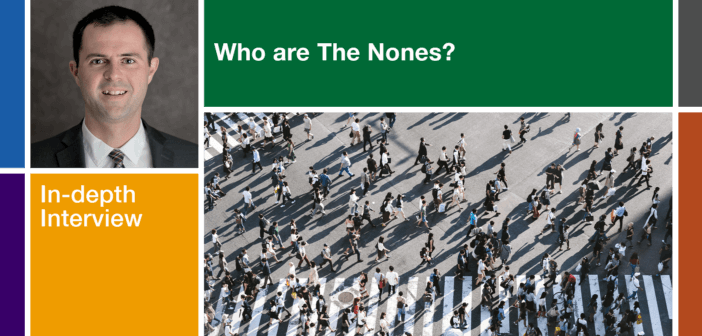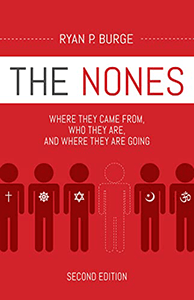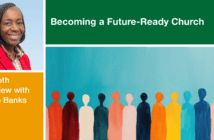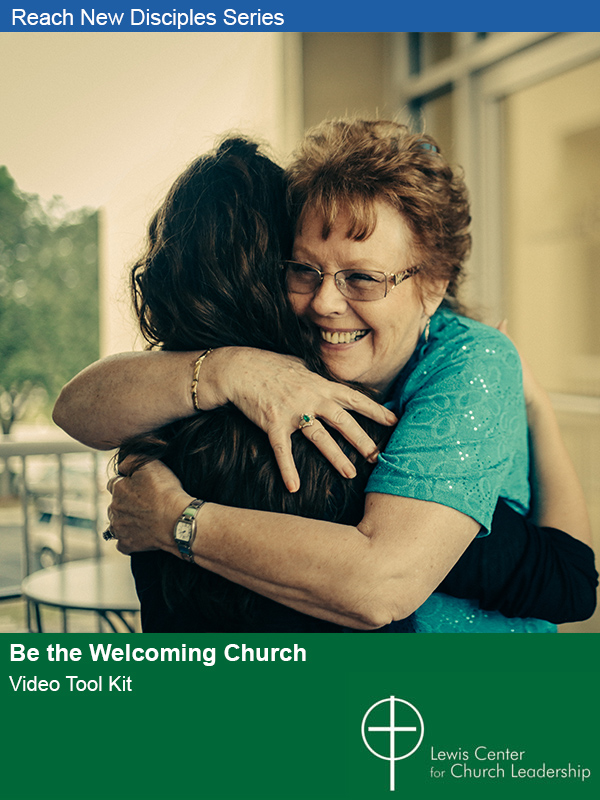The rapid growth in the percentage of Americans claiming no religious affiliation is drastically reshaping the country’s religious and cultural landscape. Ann Michel of the Lewis Center interviews Dr. Ryan Burge, a leading expert on the “Nones,” about the characteristics of the growing cohort of Americans who say their religion is “nothing in particular.”
Listen to this interview, watch the interview video on YouTube, or continue reading.
Ann Michel: Could you define the term “None” and describe how this segment of our population has changed in recent years.
Ryan Burge: The Nones are comprised of three subgroups: atheists, agnostics, and a group called “nothing in particular.” If we put five Nones in a room, one would be an atheist, one would be agnostic, and three would be nothing in particular. So, most Nones are not atheist or agnostic. They’re nothing in particular. This group of Americans was about five percent of the adult population in the early 1970s. They got to about seven percent by 1991. Since then, we’ve seen an exponential rise in the share of Americans who have no religion. Today, depending on what survey you look at, about 30 percent of adult Americans say so they have no religious affiliation. Among the youngest adults, Generation Z, it’s probably over 40 percent. I think it’s the largest shift in American culture in at least the last 40 years. And I think we are not fully grasping all the implications and complications that come in American life because of this change.
Ann Michel. In your book you examine a wide range of factors that may have played a role in this trend: secularization, the rise of the internet, social isolation, changing family structures, and so on. But you conclude that “the best and clearest explanation of the rapid rate of religious disaffiliation can be traced back to the recent political history of the United States.” You suggest there has been an exodus of liberals from the church since the rise of the religious right. Can you explain this hypothesis?
Ryan Burge: This is something that sociologists have been looking at for about 20 years. So, I’m not the first one to say, “It’s all politics.” But if you look back at American religious history, especially among white Americans, for a long time there was space for both conservatives and for liberals. If you walked into an evangelical church in 1985, you’d be just as likely to sit next to someone who voted for a Democrat as someone who voted for a Republican. And the same was true in mainline churches. If you were in a Methodist church, an Episcopal church, or even a Catholic church, the pews were very divided. There were Democrats and Republicans.
Since then, we’ve seen a homogenization process where white religion has become overwhelmingly Republican. There is no large liberal denomination in America that comes even close to matching the size, scope, and power of the Southern Baptist Convention. That convention has 15 or 16 million people and 75 percent of them voted for Donald Trump in 2020. The counterbalance is the Episcopal Church which has about two-and-a-half million members, but only about 500,000 go to church every Sunday and about two-thirds of them voted for Joe Biden in 2020. So, in terms of scope and scale, there is no large liberal white tradition, Protestant or Catholic. And I think a lot of moderate and liberal white Protestants and Catholics just said, “I’ll just stay home on Sunday because it’s easier to stay in my bed than go hear something I don’t want to hear.”
There are pockets of liberalism, but they are almost always confined to urban and suburban areas, not rural America. My county in rural downstate Illinois, Jefferson County, has about 40,000 people. There are four mainline churches in the entire county. My American Baptist Church has 10 people on a good Sunday. The Episcopal Church doesn’t even meet anymore because they can’t find a priest. The Evangelical Lutheran Church of America (ELCA) and the PCUSA joined together because they couldn’t afford separate buildings anymore. Combined, they may have 50 or 75 people on a Sunday morning. The United Methodist Church has a couple hundred people. They are the prominent, wealthy congregation downtown. But they have a looming vote coming over same-sex marriage and whether to stay in the denomination. And there’s a good chance that congregation will be significantly smaller in 10 years than it is today. So, there might be a scenario in 10 years where there is one functioning mainline church in a county of 40,000 people. But there are probably a hundred, if not more, non-denominational, evangelical, Southern Baptist, Pentecostal, or charismatic churches. In rural America, we’ve seen the decimation of moderate or liberal religious organizations. So, people who are moderate or liberal have no place to go.
Ann Michel: When we imagine what a None looks like, many of us think of a millennial hipster. Young. White. Reasonably well-educated. More likely a guy than a girl. But your book explains that as the Nones have become a much larger demographic segment. They have also become more diverse and reflective of the racial and gender diversity of our country. Could you speak to that?
Ryan Burge: What you described is the textbook atheist — an upper-educated, upper-class white guy living in an urban or suburban area. Atheists are 60 percent men and 40 percent women. They are the most gender imbalanced religious group in America today. But, again, atheists are only about six percent of the American population. They’re relatively small compared to the 22 percent of Americans who are “nothing in particulars.” It is becoming the default category for American religion.
These folks are not doing well from a socioeconomic status standpoint. They are the least educated religious group in America today. About half of atheists have a four-year college degree. Only 25 percent of “nothing in particulars” have a college degree. Sixty percent of “nothing in particulars” make less than $50,000 a year as a household. A third of “nothing in particulars” have a high school diploma or less and make $50,000 a year or less. So, they are falling behind educationally and in terms of income. A third of this group is just struggling. Additionally, they don’t put up political yard signs. They don’t go to political meetings. They feel left out, left behind, lost, unmoored, and disconnected from the larger society. They feel like society doesn’t work for them. That leads to a lot of bad outcomes. So, from a societal standpoint, I think the “nothing in particulars” are really important for the future of American democracy and religion.
Ann Michel: You also say they are the biggest potential mission field for the American church. I was surprised to read in your book that 15 percent of folks who say their religion is nothing in particular actually attend religious services at least once a month.
Ryan Burge: There’s a great book called Secular Surge by Campbell, Layman, and Green. They make the point that there is a big difference between being secular and being nonreligious. Secular people have thrown off the religious worldview and replaced it with something else. Nonreligious people have gotten rid of religious thought but have not replaced it with anything else. They are defined by what they are not rather than by what they are.
I think these “nothing in particulars” are not antagonistic toward religion. They’re antagonistic towards a lot of institutions, and religion just happens to be an institution like banks or big business or politics or whatever. But they don’t have a specific beef against religion. That’s why they are still somewhat open to the idea of religious practice. A third of them say religion is at least somewhat important in their lives. They still see some value in it. But they’re not willing to be labeled as Protestant, Catholic, Mormon, Buddhist, or whatever.
I look at panel surveys that ask the same people the same question over a long period of time. One of these survey panels goes from 2011 to 2020 — nearly a decade and covering the Trump years, too. And about 15 percent of those who said they were nothing in particular in 2011 became Christian by 2020. Fifteen percent of the 22 percent of the population that is nothing in particular and about three percent of all Americans, went from being nothing to being something in that period of time. I think that’s one of the most hopeful things in the data.
Ann Michel: So many others who write about the Nones use the term “spiritual but not religious.” But you don’t use that terminology.
Ryan Burge: I don’t find that an incredibly helpful distinction because at almost every level the data suggest that Americans are deeply spiritual. Many people would be shocked to know that over 90 percent of Americans still say they believe in God at some level. So, we are overwhelmingly at least an aspirationally religious or spiritual people. I think this is really about institutions and institutional trust — people who like Jesus and God but just don’t like the church because it’s an institution.
I think the biggest crisis we’re facing in America today is a crisis of trust — both institutional and interpersonal trust. Religion used to be really good at showing people that institutions may be bad in some ways but, overall, they do good things because they’re made of people. Because churches used to be places of diversity — political diversity, economic diversity, educational diversity — they also taught us that people who are different than us are not bad. But now churches have become homogenized. And that creates silos where you look at other people and say, “You’re wrong. We’re right. We’ve got it all figured out over here.” That’s really bad from a democracy standpoint — democracy works because we tolerate people who are different than us. We have less tolerance and less trust now. We’re much more suspicious and cynical.
I think religion used to be the ultimate cynicism fighter. But now that fewer people are going to church, we’re not hearing those messages of hope. And I think we’re reverting back to some of our worst impulses. We don’t trust anyone. We don’t trust any institutions. We just fight for ourselves and mind our own business. That’s not how we’re designed to work in a democracy. I think we need to be very clear about the fact that cynicism is bad and that we, as Christians, especially, need to fight back against cynicism. We need to be hopeful about the future, about each other, about institutions, and about society.
Ann Michel: The second edition of your book covers the pandemic years. I think many of us would guess that the pandemic really accelerated the trend toward religious disaffiliation. But you conclude that the pandemic wasn’t really that big of a factor.
Ryan Burge: There are two competing theories about the impact of the pandemic, which really go in opposite directions. One is that the pandemic made us more introspective. It gave us time to pause and think about our lives and our spirituality, and some people kind of woke up and said, “I need to get back in church because I need to have purpose and meaning in my life.” The other school of thought was that people got out of the habit of going to church, and they never got back into the habit when churches reopened. If you look at the data, you really see neither theory has much confirmation. If attendance declined three percent between 2019 and 2022, is that because of COVID? Or is it just a natural decline that was going on in America for the last 30 years continuing through COVID? These are not easy questions to answer, and we may never really know the answer to these questions, even in five or 10 years.
Ann Michel: All of this begs the question for church leaders: What can we do? One of your suggestions is that churches really need to get to know people who have left the church, establish relationships, listen to their stories, and hear the honest truth of what’s going on in their lives.
Ryan Burge: There are 80 million Nones in America today, and they all got there by a different path. In doing talks and speeches, people come to me afterwards and say, “Here’s my story,” whether it be “I got divorced” or “I grew up in a nonreligious household” or “I’m a political liberal in a conservative community and I couldn’t stomach that anymore.” Sometimes they left because they don’t like Trump, or MAGA, or whatever. But sometimes its: “I grew up in a community that doesn’t affirm gay people.” Or “I was abused by my parents, and they said, ‘Spare the rod. Spoil the child’ to me when they were hitting me.” Or “I was sexually abused by a pastor.” Or “I was spiritually abused by a pastor.” You’ll hear all these stories. There are often commonalities but there are some differences, too. Every individual has their own story, so we have to be better listeners.
And I think the key is just to listen because you’re not going to be able to solve all their problems. If they were spiritually abused when they were 12 years old, you can’t fix that in one meeting or 10 meetings or even maybe a hundred meetings. Your job is to listen, to validate, and to say, “I hear what you’re saying.” Be willing to hear these stories of trauma because they do exist. Don’t try to sweep them under the rug. Don’t try to be apologetic or say, “Oh, but what about this? And what about your soul?” No, just listen. Be a human being first and an evangelist second. You will accomplish a lot more if you build a relationship with no ulterior motives by being open and listening to what they tell you.
Ann Michel: You also have some advice about how churches might address political issues within this context of polarization.
Ryan Burge: You can’t just not talk about it. If you don’t disciple your folks on political issues, someone else will, whether it be Tucker Carlson or Sean Hannity or Rachel Maddow or Chris Hayes. Power loves a vacuum. If you don’t speak into the political power that we have as Americans, someone else is going to. But you have to do it in a bipartisan, nonpartisan way, which means talking about the Bible. Sometimes the Bible is going to make Republicans feel bad, and sometimes it’s going to make Democrats feel bad.
The Biblical concept I talk about is imago Dei — that every human being is born in the image and likeness of God. And that means that God cares about the unborn, absolutely. But God also cares about the disabled. God also cares about the immigrant. And God cares about people on death row. Every human being is born in the image and likeness of God. I think if you can address politics through a theological lens, you’re going to get a lot farther and you’re going to get a lot more respect from your people, too, because it’s going to force them to think about their political ideology. It’s hard to talk about politics from the pulpit, but we have to. I think it’s our mandate as pastors to try to speak into the lives of our people about politics in a neutral, objective, bipartisan, nonpartisan way.
Ann Michel: I wanted to share the last few sentences of your book, because I found them so poignant. You write: “The winds of secularization and polarization are swirling like never before. Most of that seed is going to fall on rocky soil, never to reap a harvest. And it seems that there are fewer people to spread it every year. It’s easy to give up hope. But we must recall the words of the Apostle Paul to the church in Galatia: “So let us not grow weary in doing what is right, for we will reap at harvest time, if we do not give up” (Gal. 6:9). Seed that expresses the love and grace and hope of Jesus Christ is never truly lost. Don’t give up!”
The Nones: Where They Came From, Who They Are, and Where They Are Going, Second Edition (Fortress Press, 2023) by Ryan Burge. The book is available at Fortress Press, Cokesbury, and Amazon.
Related Resources
- Taking Church to the Community, a Lewis Center video tool kit resource
- Understanding the Nones by Ann A. Michel
- The “Nones” and the Spirituality of Everyday Living by Keith Anderson
Cover photo image by Ryoji Iwata on Unsplash








